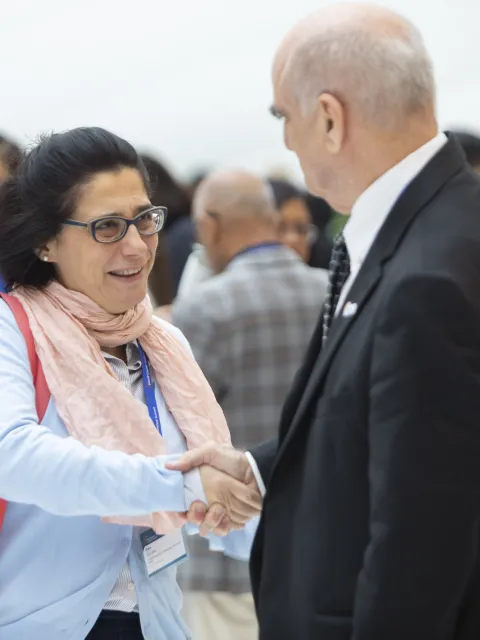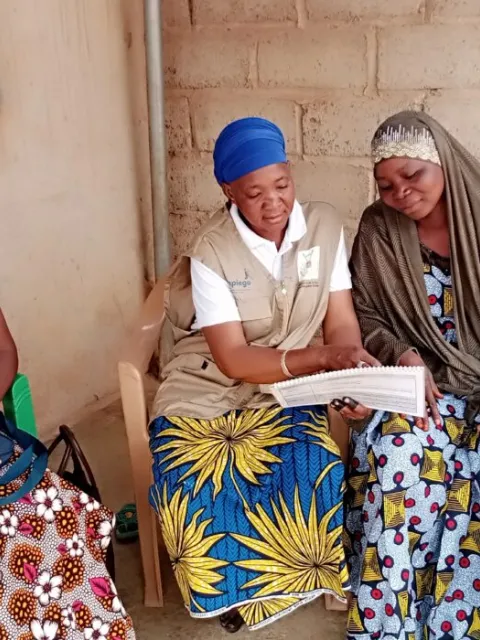Cancer and COVID-19 in Peru: cancer advocacy success in the midst of a deadly pandemic
Cancer screenings and treatments have dropped dramatically in Peru due to COVID-19, which has strained an already fragile health system and exacted a heavy toll on cancer services. Yet UICC member Esperantra continues to advocate successfully for improved and more equitable access to cancer care.

Peru has been one of the countries hardest hit by the coronavirus pandemic, with the highest recorded per capita mortality rate in the world. This has overstretched an already fragile health system, with a lack of oxygen tanks and overrun intensive care units.
According to Karla Ruiz de Castilla, MA, Director of Esperantra, a patient assistance and advocacy organisation, the reallocation in 2020 of oncological doctors and nurses as well as funding for cancer to the COVID-19 response caused widespread disruption to cancer services.
The country experienced a significant decline in cancer screening, hospitalisations and treatments, pointing to a number of cancers that have gone undiagnosed. Esperantra conducted a study between March and May involving more than 660 cancer patients; the study was published by the Peruvian society of medical oncology and found that 70% of patients missed or had to reschedule their medical appointments, and 62% were late in receiving their treatments.
Based on statistics from Instituto Nacional de Enfermedades Neoplásicas (INEN), Esperantra also found that, in April 2020 as compared to April 2019, 86% fewer endoscopies were performed, only 27% of expected radio-diagnoses took place, 35% of people requiring chemotherapy and 46% of those needing radiotherapy accessed their treatments, and only 10% of surgeries were performed.
The number of new COVID-19 cases and deaths has slowly dropped since the peak in May 2021, and Ms Ruiz de Castilla says they are now seeing a return to normal with people leaving their homes to consult their practitioners, but not all oncological services have been reactivated.
“We are still experiencing worrisome interruptions. Radiotherapy has not yet resumed, and this is essential for many cancers, in particular those of the neck and head. Furthermore, we have a free HPV vaccination service to help prevent cervical cancer, but this programme is less funded and, in 2020, 79% have not received their second HPV vaccine dose. More than a year into the pandemic, it is past time to refocus on cancer.”
– Karla Ruiz de Castilla, MA, Director of Esperantra, the patient assistance and advocacy organisation
Ms Ruiz de Castilla does point to good news on the horizon, with the approval of a paediatric cancer law that aims to provide financial support to parents of young children with cancer who need to travel to Lima for their child’s treatment. “A lot of children with cancer have to interrupt their treatment because parents cannot take care of them when they come to Lima. We have 1,800 paediatric patients and this new law will certainly benefit this community,” she says.
Esperantra is part of UICC’s Cancer Advocates programme, designed to support UICC members in their national advocacy efforts. Thanks to work carried out with the Latin-American coalition against lung cancer (ULACPUL), Esperantra saw the government enact regulation in March 2021 to provide lung cancer patients with access to treatment based on biologics, a more targeted and less toxic treatment than chemotherapy.
Esperantra has also pursued advocacy work with authorities on a national law for cancer, which incorporates Esperantra’s call for greater decentralisation of health services so that people with cancer can access treatment in their province without having to travel to the capital, Lima.
Ms Ruiz de Castilla says that the new government is exploring Universal Health Coverage but fears that the money traditionally allocated to cancer may be reassigned to COVID-19 and reduce the supply of quality services for cancer. This, then, is the greatest challenge facing cancer organisations, particularly in countries suffering the worst of the COVID-19 pandemic: ensuring that cancer is not forgotten in the pandemic response.
Last update
Monday 06 September 2021
